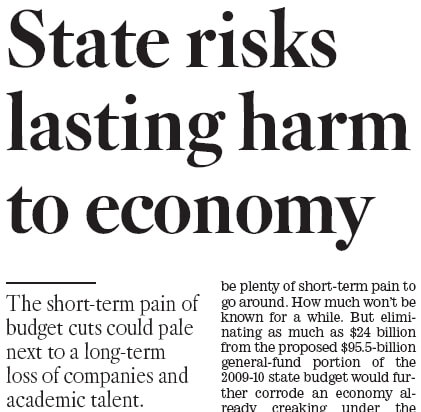What the L.A. Times Talks About . . . And What It Doesn’t Talk About
To fully understand Big Media bias, sometimes you have to look at what they don’t say as well as what they do. Perspectives that support the Democrat agenda get splashy treatment, while perspectives that favor the Republican agenda are either whispered and then immediately contradicted — or not even mentioned at all.
The L.A. Times does this twice today.
First example: Today the L.A. Times runs a story titled Cheney’s assertions of lives saved is hard to prove. The deck headline reads: “Arguing against Obama’s policies, he says that the Bush administration’s approach to terrorism spared ‘perhaps hundreds of thousands.’ Experts say no evidence of that has emerged.”
The story is very weak to begin with. Cheney said that Bush administration policies were effective against al Qaeda; that effectiveness saved lives; the number of lives saved could be in the thousands and could “perhaps” be in the hundreds of thousands. The experts in the story (both of whom I have written for comment) don’t contradict this; instead, they merely say it’s hard to prove. Not mentioned: the fact that Obama is sitting on the proof, which wouldn’t help the terrorists (even as he releases details of techniques, which does help them).
Meanwhile, as reader Dana points out, The Times reported President Obama’s recent claim that Guantanamo Bay’s prison “likely created more terrorists around the world than it ever detained.”
Is that assertion hard to prove? I suspect it’s every bit as unprovable as Cheney’s statement, if not more so. One wonders why the President’s assertion gets no scrutiny, while Cheney’s merits an entire article of second-guessing.
Editors: can we get an article quoting experts who say that assertion is hard to prove? Together with headlines disparaging the claim? Thanks!
Second example: On today’s front page, The Times runs an above-the-fold article about how horrible proposed California budget cuts would be:

We’re told that businesses could be driven out of the state by . . . tax cuts? No, by — I’m not making this up — decreased government spending:
The long-term effects of Sacramento’s financial woes, meanwhile, could far outweigh the near-term effects. In particular, the expected deep cuts in education spending could thin the state’s human capital, potentially forcing California companies to look elsewhere for skilled workers as well as new plants or even headquarters.
Lower government spending also hurts business that keep the bloat in our oversized bureaucracies:
Distressed car dealers could see sales to state agencies shrink, printing shops may lose business as courts and other government operations shorten their workweek, and office-equipment suppliers would lose sales as cash-strapped agencies make do with aging copiers.
Heaven forfend that bureaucrats have anything but the very latest in Xeroxing technology. That’s worth a few billion right there, isn’t it?
Promising students would go to other states, taking their future skills, earnings and, possibly, Nobel Prizes elsewhere. California companies would then find it harder to attract high-value employees who might be dubious about moving to a state with sub-par schools.
If we cut public education, we’ll lose Nobel prize-winning students? That strikes me as . . . difficult to prove.
Now, I’d always heard that businesses were driven out by excessive regulation and taxation, and that high government spending, and not spending cuts, were part of the problem. And indeed, the only example of an actual business moving out of state is not because of education cuts, but rather high taxes:
Still, companies such as Solaicx have found the burden heavy enough to look elsewhere to invest.
In 2007, the company built a plant in Portland, Ore., in part because the state offered a tax incentive unavailable in its home state. California had an added disincentive: It is one of only a handful of states that charges sales tax on manufacturing equipment.
But you must risk ink-stained hands and paper cuts and turn, turn, turn those big pages allll the way to Page A16, to learn this, as well as the fact that “Businesses have long complained about big-spending government in California.”
Where is our front-page article about that? Answer: nowhere. But on the front page, we are promised a story of the “faces of the cuts.”

When was the last time the L.A. Times ran a story called “The Faces of the Tax Increases”?
The pattern is clear: this paper has certain perspectives to which it gives inches of column space and front-page treatment, like the Horrible Impact of Spending Cuts and the Questionable Nature of Republican Claims. And it has other perspectives to which it gives Page A16 treatment — or no treatment at all — like the horrible impact of tax increases and the questionable nature of Democrat claims.
The bias couldn’t be more clear.


